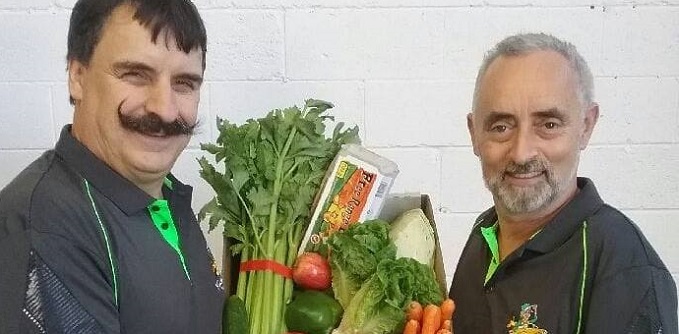
Former Aussie Farmers Direct franchisee Geoff Roberts (R) and Michael Booth of Micky Booth home delivery. Source: Supplied.
Franchisees of Aussie Farmers Direct say they have zero faith in seeing any money owed to them by the business, as the administrators of the grocery delivery chain say winding up the company “is the most viable option”.
The grocery delivery operator fell into voluntary administration in March and franchisees were left shell-shocked by an announcement that the company would cease operating immediately.
In a report to creditors published last Thursday, administrators Craig Shepard and Leanne Chesser of KordaMentha said they had reviewed the company’s financial situation but were unable to find a buyer. Therefore, “winding up the companies appears to be the most viable option for creditors”, they said.
The business owes $86.7 million to creditors but there is only around $3.4 million in value to be realised from the liquidation of the business, according to the administrators. There is still a process underway for the possible sale of intellectual property and assets associated with the business.
For the 100 franchisees who operated Aussie Farmers Direct grocery runs across the country, however, the prospect of recovering any debts from the business is a pipe dream.
It does not appear possible there will be the cash available to reimburse franchise operators, who, as unsecured creditors, remain out of pocket from their last weeks of trade before the company collapsed.
“I’ve put in a debt claim, but I do not believe we’ll ever see that again,” former Victorian franchisee Geoff Roberts tells SmartCompany.
Roberts and his wife Heather had invested around $75,000 to buy Aussie Farmers Direct franchises. He has now partnered with another Melbourne produce delivery business, Micky Booth’s, to continue delivering groceries in a different format.
“It has been tough but we’ve had an enormous amount of support from people who have just gone out of their way for us,” Roberts says.
Despite the significant stress caused by the Aussie Farmers Direct experience, Roberts says it’s great to be back doing the work he enjoys day to day.
“It was good to be back — there were lots of calls and SMSes [to customers],” he says.
Fellow former franchisee Nigel Brooke has taken a slightly different path, deciding to strike out on his own to form his own grocery delivery business, Hills Milk and Grocery Run. He’s still developing a website, so for the time being he’s taking food and grocery orders directly via email, sending customers a spreadsheet to fill in their orders.
“It’s been hell doing it manually — but I think it’s good,” he tells SmartCompany.
Brooke says he’s “very disappointed” by how the voluntary administration of the business came about. He spent $130,000 on Aussie Farmers Direct franchises and was planning on a selling these just as the business collapsed.
However, now as a self-contained business delivering two days a week, Brooke says he can “breathe again”.
The benefit of striking out on his own is he has more control over all elements of his business — from delivery times, to the partnerships he can strike with other small businesses in the area to deliver their produce.
“The freedom is back. There was supposed to be a lot of freedom with the franchise, but here right now, if I’m running late or it’s too hot, I can control things,” he says.
According to the administrator’s report, franchisees are owed $384,000, while producers are owed $3.01 million. Both groups of creditors are unsecured.
Effects of a franchising collapse can be “devastating”
Cases like Aussie Farmers Direct demonstrate that when a franchisor falls into administration, or looks like it will be wound up, franchisees are often left without much choice as to their next steps, says principal lawyer at Legal Enablers Caroline Mense.
“Usually, the insolvency practitioner takes the place of the franchisor and can enforce the franchising agreement,” Mense tells SmartCompany.
The challenge for franchisees tends to be that if they want to keep operating their businesses, basics like paying rent or supplying products are not always straightforward during these times, she says.
“They are often stressed about paying rent, staff and suppliers in a situation where the brand is compromised.”
Franchise law expert Marianne Marchesi tells SmartCompany that typically, franchisees are left in “a holding pattern” until the full administration of a company is completed.
Without the support of a head office franchisor, it is possible for individual franchisees to band together and keep running the business themselves as a kind of collective, but logistically this is very challenging.
“They could look at grouping together and keeping the business going as a collective, but that’s where it gets a bit tricky,” Marchesi says.
Franchisees also need to keep track of what happens to the intellectual property of the franchisor, including customer databases and brand names, even if a sale of the business as a going concern doesn’t occur, Marchesi says.
“They probably do need to be conscious of that if it gets bought,” she says.


COMMENTS
SmartCompany is committed to hosting lively discussions. Help us keep the conversation useful, interesting and welcoming. We aim to publish comments quickly in the interest of promoting robust conversation, but we’re a small team and we deploy filters to protect against legal risk. Occasionally your comment may be held up while it is being reviewed, but we’re working as fast as we can to keep the conversation rolling.
The SmartCompany comment section is members-only content. Please subscribe to leave a comment.
The SmartCompany comment section is members-only content. Please login to leave a comment.